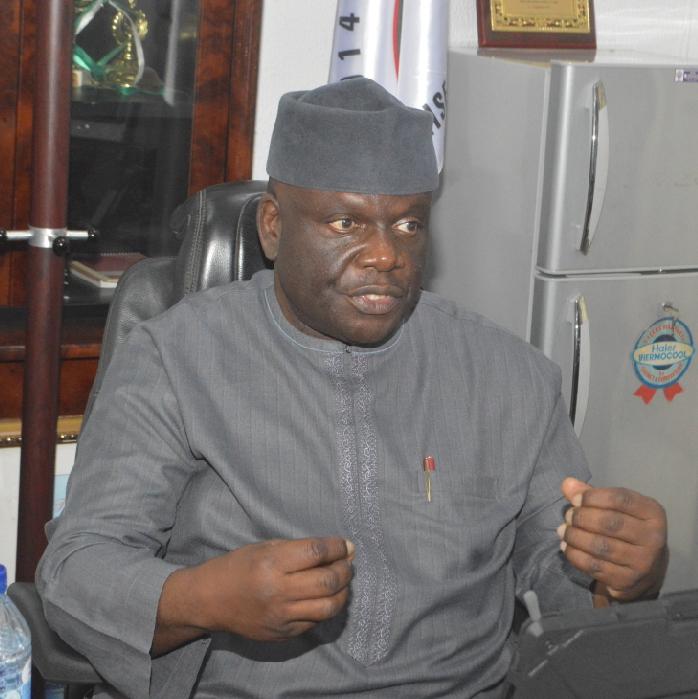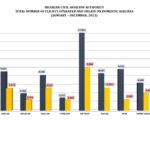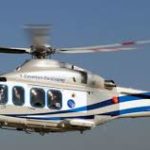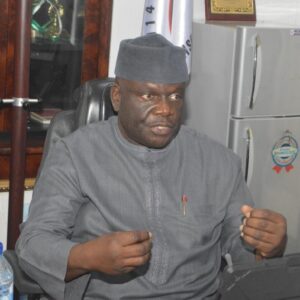
In a recent interview with Director General of the Nigerian Civil Aviation Authority (NCAA), Captain Musa Nuhu, he confirmed that adjustment had been made on the sharing formula on Ticket Sales Charge (TSC) and Cargo Sales Charge (CSC) in which the regulatory authority now gets about 58 per cent.
The Director General argued in the interview that other agencies that benefit from the charges have other sources of income and government also funds them.
The Nigeria Airspace Management Agency (NAMA) for example, benefits from the fund and also generates revenues from other sources. It is the same with the Nigerian Meteorological Agency (NiMET), the Nigerian College of Aviation Technology (NCAT), Zaria and the Accident Investigation Bureau (AIB).
Nuhu argued that the 58 per cent NCAA takes from the TSC/CSC is about 95 per cent of its income because the agency has no other major source of revenues.
“There is a bit of adjustment on the 5 per cent TSC/CSC and I have heard a lot of people say that NCAA is taking a bulk sum from the 5 per cent. That 58 per cent that we take is about 95 per cent of my own source of income. For the other agencies, whatever they get from it may be about 20 per cent of their own income because they get from other charges they render to clients.
“But, NCAA doesn’t get any allocation from the Federal Government budgets. All the other agencies get from the government budgets. People just look at the TSC/CSC, but they don’t look at the bigger picture. Other agencies get annual budget from the Federal Government, landing and parking charges, over flier charges and other sources of revenues. So, all these things were taken into consideration before arriving at whatever we get from the 5 per cent,” he said.
The Director General emphasised that other revenue sources where funds could accrue to the regulator authorities are lean, noting that cost of services the agency renders to the public, including airlines has remained the same over the years.
“Also, don’t forget, our fixed schedules have remained the same over the years. To get an Air Operators’ Certificate (AOC), it is just N200, 000. That is less than a return business ticket from Lagos to Kano, basically, we are subsiding the industry. That is the least charge. Some organsations are buying planes worth tens of millions of dollars, but they are only paying N200, 000 to get a certificate that will pronounce them as a commercial operator. Don’t you think something is wrong somewhere?
“The N200, 000 cannot even do manual reviews of the process, not to talk of training or retraining an inspector and you still pay him his salaries to provide those services to the airlines. So, that is one of those things we need to look forward to because the N200, 000 is less than $300. I have countries in Africa that charge $200,000 for an AOC,” the Director General said.
While some industry observers disagreed with the Director General over the cost of obtaining AOC, NAMA has confirmed that in addition to its share from the TSC/CSC it also earns revenues from terminal navigational charges, over flight charges and en-route charges, it still collects about 10 per cent from the fund. In addition to that the Federal Government funds all critical projects in NAMA.
“NAMA does not collect money from the federal government, except for critical projects. It is from the money we earn that we pay salaries; we pay overhead costs and also service our equipment. It is when there is critical projects to be executed that the federal government comes in,” the NAMA official told THISDAY.
NCAT also earns money from the fund in addition to the fees students pay and also, government provides the funds for major projects in the College. So it is the general opinion in the industry that those who share from the TSC/CSC are merely using it to support their fiscal operations, except NCAA, which relies heavily from the accruals to sustain itself.
Accident Investigation Bureau (AIB) is said to earn the least from the Ticket Sales Charge and funding from the federal government.
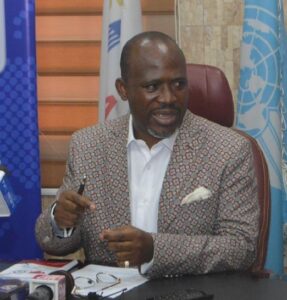
But reacting to the statement made by the Director General of NCAA; that
operators only pay N200, 000 for AOC; industry stakeholders argued that airlines pay far more than that before they obtain their AOC, insisting that the process is outrageously costly, explaining that the N200, 000 is a statutory fee paid by the airline seeking for the certification.
One of the operators stated that by the time “you have an AOC, if you are charter operator who can use just one aircraft, you would have to either lease or buy. There is no lease process for the Nigerian market that will cost you less than $1 million to acquire an aircraft till AOC issuance. Plus demonstrations cost is between $100,000 and $350,000 depending on machine etc.”
The stakeholder said that the airline has to pay capitalisation at the CAC (Corporate Affairs Commission) for the category of license.
“One needs to prepare with no less than $2 to $6 million to start any business of air transportation to client use level. I am also not exact about the costs. Can be more but certainly not less if you want to operate in Nigeria,” the stakeholder said.


